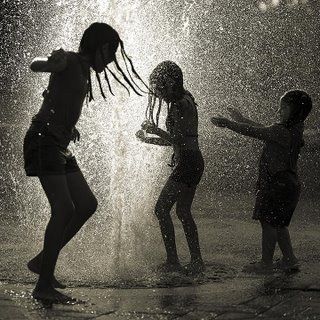
Relationships
This Valentine’s Day, Give a We-Story Instead of Flowers!
Couples can use shared memories to reaffirm love.
Posted February 14, 2014


It’s a week before Valentine’s Day and Jack and Heather are in another session of couple therapy. They have been working hard on trying to improve their communication and reduce the friction in their marriage. They’ve tried listening strategies, date nights, appreciation exercises, everything under the sun, but something fundamental is missing. They are two separate individuals stuck in a familiar rut, still together, but not a “team,” not a “we.”
Jack is talking about how lonely he feels and then he starts to talk about a memory:
“Do you remember, Heather, that time in Lincoln Park looking out toward the lake when Ellie and Will were like 3 and 5? We had planned a picnic and it started to rain. Ellie stuck out her tongue and started to chase the raindrops. You grabbed her hand and I grabbed yours and Will grabbed mine. We made a ring, catching raindrops with our mouths open. We were just dancing around.”
Heather looked up and smiled for the first time in a long while, “I remember.”
For this couple, in the throes of distress about their marriage, something very important has just happened. Not intentionally, and perhaps even out of desperation, they have found their way to a “We-Story” – a story of genuine connection and underlying love that exists between them. These stories, if carefully nurtured, can become touchstones for couples that are trying to find their way back to intimacy in their relationship. They invoke a moment of shared faith and speak to the possibilities that exist when both partners give fully of themselves.
Over the past several years, in both our clinical practice and research on couples, we have studied the positive power of these “We-Stories” in couples’ lives. We have worked with couples of all ages and backgrounds, including a recent study of military couples re-united after a lengthy deployment. Repeatedly, we have found that couples that can find their stories of connection show greater overall wellbeing and better marital adjustment. We-stories can be recruited in times of conflict to re-orient the couple and shift them back to their basic commitment to each other. We would never claim that these stories in and of themselves are the healing factor for a couple, but they are a vivid and symbolic expression of love and compassion. They help partners re-commit to the necessary steps of rebuilding trust and romantic connection in their relationship.
So, whether you are a couple that is in distress or one that is only looking to deepen your existing bond, we suggest that instead of flowers, you take time to think about and share a “We-Story” from your relationship. Think of a moment of connection or compassion or of a shared struggle that led to triumph. Write it down and keep it in a place where you can find it when you need it. Such stories remind us, as we say in the therapy world, that, “love is in the room.” And isn’t that the real essence of Valentine’s Day?
Jefferson A. Singer, Ph.D. and Karen Skerrett, Ph.D. are the authors of the new book, Positive Couple Therapy: Using We-Stories to Enhance Resilience (New York: Routledge; http://www.amazon.com/Positive-Couple-Therapy-We-Stories-Resilience/dp/…). Karen is a professor of psychology at Northwestern University and Jefferson is the Elizabeth H. Faulk professor of psychology at Connecticut College.

